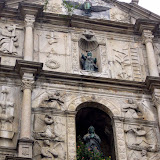Reading Notes from the Book: Ramesses, Egypt’s Greatest Pharaoh(01)
Sunday, December 23, 2007 by Eva.Usermaatre
 1, the five names of Ramsses the Great:
1, the five names of Ramsses the Great:the Horus King: Strong Bull, Beloved of Right, Truth
He of the two Ladies: Protector of Egypt who curbs the foreign lands
The Golden Horus: Rich in Years, Great in Victories
King of Upper and Lower Egypt: Usermaatre
Son of Re: Ramsses the Second, Beloved of Amun
Only the latter two names will be written in cartouche
2, the author mentioned that “arrivistes with a strong urge to justify their hold on Egyptian throne, constantly looked to the precedents”, which I am not comfortable with. The Egyptian throne was past to Ramsses the First from Horrenheb legally. Although Ramsses the First was no royal birth, the succession was totally according to the will of Horrenheb. So I think the reason of addressing precedents aimed at erasing the memories of Akenaton. By directly referring deeds done by great Pharaohs before, Ramesside Kings were trying to re-establish the glory and cutting the Akenaton out of records.
3, as a political and religious role, Pharaoh, theoretically, was not considered as an individual, but a continuality of protector and nation leader whose image remained for most of time similar. But Ramsses seemed regarded individuality was important too, as to promote his greatness, he used every chance to achieve this goal. He wanted his people but only to remember him as a great Pharaoh but also as an unsurpassable “He”.
4, in ancient Egypt there was actually no term for “religion”, and the meaning of “ancient Egyptian religion” can not be understood by the modern term “religion”. In ancient times people treated their Gods as an interpretation of the world, so say the term” science” will be more close to the meaning of ancient Egyptian religion. As the chief priest, Pharaoh should supposedly take the role more administratively than religiously. They maintained the order of world by making sure that those ceremonies would be carried out, rather than being a religious prayer all the time. What did Akenaton do wrong was that he took the role wrong; he was practically a real religious priest who discarded all his administrative duties. Or he misunderstood the role of Pharaoh? By being a religious person, he was actually denied his entire kingship. Say, maybe he was really a visionary who understood no other but his religion?









